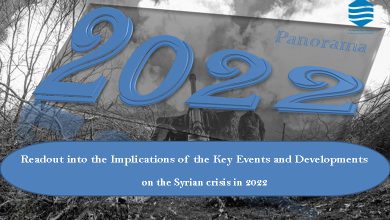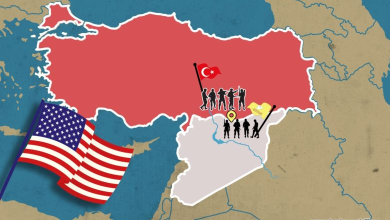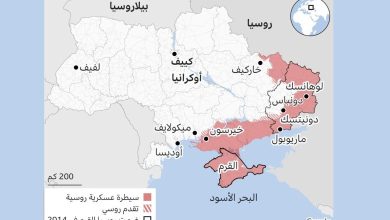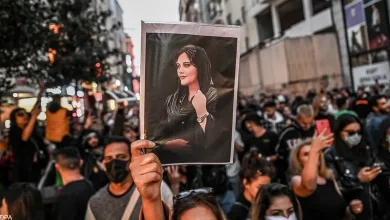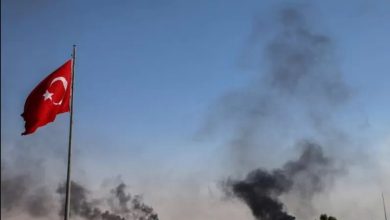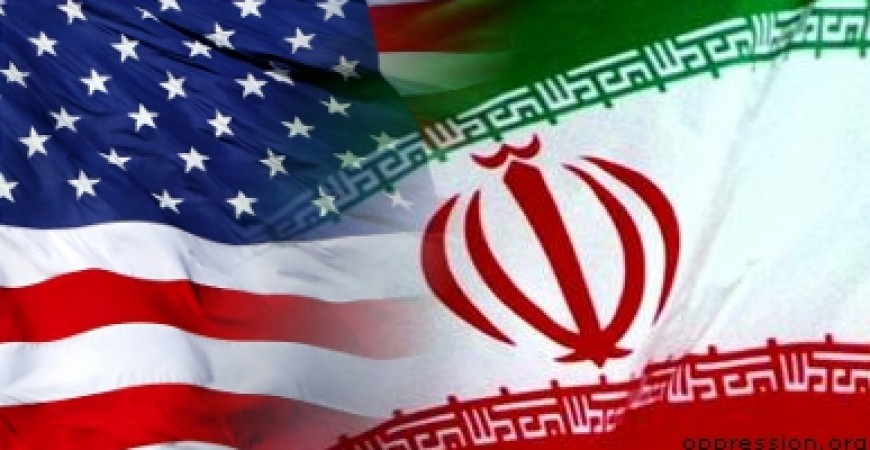
Iran and the Necessity of Recalculating
Al-Furat Center for Studies- Translation Department
Also Available in (arabic)
Many political observers of the Iranian affairs consider the Democrats’ access to the power in the United States of America as a glimmer of hope, which the Iranian regime has been waiting for, during its enduring period of the brunt of the unprecedented sanctions imposed on Iran under the Trump administration.
The Iranian regime has mastered the policy of playing on the edge of the abyss with the United States since the latter withdrew from the nuclear deal in May 2018. Its adoption of the policy of maximum pressure, which sought to put the Iranian economy into a state of paralysis, consequently, pushing the Iranian regime to sit at the negotiations table in line with the American conditions.
The war almost flared up between the two parties on several occasions; including when Iran shot down a US drone (RQ-4 Global Hawk) with a Revolutionary Guard missile on 20 July of last year. When Trump decided to launch a military strike on several sites in Iran, but he retreated from the operation ten minutes before conducting it, after warnings of the gravity of the consequences of such attacks, which were placed in his hands by experts and advisors. As well as upon the assassination of the second highest-ranking official in Iran, Qassem Soleimani, who is considered the architect of Iran’s strategic depth in the region, and the Iranian response that followed, by bombing two American bases in Iraq with ballistic missiles, dozens of American soldiers were seriously injured, according to what had been revealed later.
Thus, the two sides avoid the break out of a massive war, the consequences of which would be anonymous; if the war takes place, it will not only be in Iran, but will also ignite in neighboring countries, through the arms of Iran that have been prepared for such a war.
Has Trump’s policy of maximum pressure against Iran paid off?
The political analysts are divided concerning this issue into two teams; the first team believes that this policy inflicted a great damage on the Iranian regime by seeking to suffocate its economy; this would limit its nuclear, missile, and expansionist ambitions, as well as pitting the Iranian domestic against it.
On the contrary, the second team considers that Trump’s policy against Iran has not had a profound effect on the Iranian regime, since the oil is still being exported to countries such as China, Venezuela and Syria, though in lower rates than before, and the economic sanctions have an impact. However, it affects the government and the people, but not those who actually run Iran, which are the religious institution and the Revolutionary Guards and the networks involved with them. The Revolutionary Guard annually makes billions of dollars from drug and oil smuggling, according to American reports, in addition to a huge amount of money they get from money laundering processes and indirectly transferring money to Iran.
Among the indications that Trump’s policies against Iran were ineffective is the latter’s resorting to sign a strategic deal with China worth 400 billion dollars for a span of twenty-five years, which will lead to consolidating the power of the both two enemies of the United States in the Middle East. The other indication is the rift occurred between the United States and its European allies, especially the “Troika” States; Germany, Britain and France, which objected Trump’s request to the Security Council to re-impose UN sanctions on Iran; as a result of its violation of the nuclear deal.
Furthermore, the increase in Iran’s nuclear and missile activity; during the intensification of its conflict with the United States, we saw the production of new ballistic missiles have the name of Qassem Soleimani and Abu Mahdi Al-Muhandis, the leader in the Popular Mobilization Forces(PMF) who was killed with Soleimani by a US drone strike. In addition, Iran has increased rigidity of the nuclear file, by increasing uranium enrichment, as well as production of centrifuges.
With regard to the domestic protest movements, in which the economic crisis was one of its main reasons for launching its spark, we see that it did not leave a significant impact on the Iranian regime, instead, the regime deliberately suppressed them even more brutally than before, without being worried for any repercussions that may result in. More than a thousand and five hundreds of civilians, including about twenty children, were killed within a few days during the petrol protests in November 2019, which was considered as an international crime by the Amnesty International Report issued days ago, on the first anniversary of these protests.
As for Iran’s regional influence in the region, its proxies are still playing the roles assigned to them in Iraq, Syria, Lebanon and Yemen, and so on, and it still poses its usual threat to Israel and the interests of the United States in the region. In Iraq, you see that attacks against American interests are still being conducting from time to time, and the Quds Force is still stationed in Syria, and it is even active in the southern region on the borders of Israel, despite of an undeclared Israeli-Russian-American agreement. It states of keeping Iran away from the Israeli border inside Syria, and perhaps what confirms this argument is the recent Israeli strikes of Iranian and Syrian military targets, which came in response to the recruitment of a cell working – under Iranian direction – to plant a field of mines on the Golan border to strike Israeli soldiers.
In Yemen as well, we are still witnessing the continued Iranian support for the Houthis, and the advanced military capabilities that they have acquired, especially the use of drones to strike the targets and interests of the hostile countries to Iran in the region, and Hezbollah is continuing to manufacture precision missiles under Iranian guidance and support.
Perhaps the undeniable fact in Trump’s policy of maximum pressure against Iran, after its withdrawal from the nuclear deal, is the denial of Iran from the economic and diplomatic benefits of the nuclear deal. The United States regained its deterrent power, as America’s deterrent power had disappeared from the Iranians minds, including its Supreme Leader, Ali Khamenei, after the signing of the nuclear deal that led to the consolidating of Iran’s military capabilities, throughout its arms, inside Iran and in the region.
Will Biden be a savior to Iran from its complex crisis with the United States?
There is no doubt that the tools of the Democrats in foreign policy differ from the Republicans ones, even though the American strategy is constant without any significant change.
Obviously, the Democrats tend to use soft power and weighting diplomatic solutions to the problems they face; in their policy toward Iran, they preferred the carrot to the stick, in order to achieve their strategic goals, and there are many examples of that. Madeleine Albright, the former US Secretary of State a member of the Democratic Party in 1999, worked to restrict the Iranian opposition, and placed the “Mujahideen Khalq” on terrorist lists, in a step that many see that “it was an American concession aimed at normalizing with Iran”, and among them, John Bolton, the former US National Security Adviser. It paved the way to strike the nuclear deal, which the United States and the major powers sought, to put Iran’s secret nuclear activities under their control, in exchange, to grant Iran major economic privileges and bringing it back to the track of global diplomacy.
President Obama also allowed the Iranians to expand in the region, and he aimed at restoring serenity to US-Iranian relations, and getting Iran back to its side as its police officer in the region, since it used to during the reign of Shah Muhammad Reza Pahlavi, and a safeguard of maritime security. Plus, the transfer of oil from the Gulf to Europe.
However, the question is; would Biden follow the same approach as Obama did, and revive the nuclear deal and give the kiss of life to Iran again?
The Iranians have been impatiently waiting for the day when the Trump administration would leave the White House and the incoming of Democratic president like Biden to power, especially since Biden was close to the nuclear deal, and was holding the post of Vice President in Obama’s administration when he signed in 2015.
This argument is applied to the reformist and moderate tendency in Iran; they believe that dialogue with Biden is necessary, in order to avoid their country more pressures, losses and isolation. However, the fundamentalist hard-liner tendency, who is led by the Supreme Leader, Ali Khamenei, who rejects dialogue, and he considers that there is no difference between the Republicans and the Democrats, and he is firmly convinced that both are working to achieve the security of Israel, and ultimately weaken Iran in the end.
The fundamentalists were opposed to the nuclear deal since the very beginning, and it seems that they will regain their control over the nuclear negotiation file, by returning it to the National Security Council, after President Rouhani – who is considered within the moderate tendency – put it under the administration of his foreign minister, Jawad Zarif in 2013.
Although Hassan Rouhani chairs the National Security Council, and Jawad Zarif is one of its members, any decision issued by the council must have Khamenei’s approval personally, before it is implemented.
There have been many obstacles between the United States and Iran in restoring their compatibility, especially since the Trump administration has put many obstacles. They are difficult to be overcome easily by the new administration in a short period. The matter goes further than that, as Trump tries during the remaining period of the transitional phase to increase these obstacles in the way of his Democratic rival Biden. By imposing series of new sanctions on Iran related to the human rights file inside Iran and destabilizing regional security, if Biden bypasses or compromises on these matters, he would be exposed to hold accountable before the America’s interior.
Moreover, the issue of the development of Iran’s military capabilities, and its regional interference have become a source of great concern to the U.S. allies, especially Israel, and they will try to resort to all means so that the United States would not return to the nuclear deal. Given that, it was one of the staunchest opponents of signing the deal. It was one of the reasons behind Trump’s withdrawal from it, after being able to steal important documents related to the Iranian nuclear program in 2016, through a special operation by the Mossad, in which it revealed the existence of a secret activity practiced by Iran outside the terms of the deal.
As for Iran, there will be obstacles also to return to the compatibility with the United States, in addition to its commitment to issues that it it considers among the principles of its military doctrine that it refuses to compromise. There is another issue that may be among the Iranian calculations, which is destabilizing the confidence of its Russian and Chinese allies, in case of a potential rapprochement between Iran and the United States.
Many believe Biden will follow a centrism policy, between the flexibility that was shown by Obama towards Iran and the rigidity that was shown by Trump. According to a report by the Israeli newspaper, Yedioth Ahronoth: the strategy developed by the Biden team, there will be two-stage of negotiations with the Iranians. Negotiations will start in the first phase as soon as Biden enter the White House, but the real negotiations will be awaited until the aftermath of the Iranian presidential elections in June of the this year, and then a real agreement would be signed, without gaps with the Iranians.
Expectations indicate that the fundamentalists are the candidates to get access to the presidency in Iran, and this is clear because of the exclusion of reformists in the parliamentary elections that took place last February, 2020, and the assumption of “Muhammad Baqer Qalibaf,” the fundamentalist and former officer in the Revolutionary Guard, for the presidency of the Islamic Shura Council.
Accordingly, Biden would want to reach a consensus with the fundamentalists, who were aiming at every occasion to attack President Rouhani, who was inclined to open up to the West to achieve economic gains, and to consolidate Iran’s presence in global diplomacy.
However, it does not seem that the task will be easy for the new American president, in light of Biden’s pledge of his commitment to prevent Iran from acquiring nuclear weapons, and to confront Iran’s interference in the region and destabilizing its security, in addition to confronting its ballistic missile program and holding the regime accountable for human rights violations.
The issue of developing ballistic missiles is considered by Iran as a legitimate right to enhance its defense capabilities. Khamenei himself refused to discuss it, when nuclear negotiations began between Iran and the major world powers in 2013, and this extended to the rest of the Iranian regime as well, who consider this issue a conviction for the Islamic republic’s regime. As a member of the National Security and Foreign Policy Committee in the Iranian Parliament, Yaqub Reza Zadeh, considers that Iran’s missile program and Iran’s relationship with its allies in the region are two basic pillars of Iran’s “deterrence” strategy, which cannot be negotiated.
Consequently, this strategy will not be subjected to change, as long as the theoretical and revolutionary foundations of the Islamic revolution are based on protecting the right of the “weak” in face of the “arrogant”, such as, America and Israel who are considered in the forefront. It considers its interference in the countries of the region as a mean of defense for the rights of Muslims based on Article (152) of the Iranian constitution, in which Iran commits itself to defending the rights of all Muslims in the world.
There is no doubt this motto that the Islamic Iran raises and justifies its intervention in neighboring countries is nothing but consolidating what it calls “strategic depth”. By expanding the scope of the battle when its break out against the United States or Israel, and to manage it from outside Iran’s borders, through its arms, which spent a huge amount of money on them, and armed them with unconventional precision weapons and missiles.
Perhaps the possible scenario for what Biden could do towards Iran is to think about defusing the crisis between the two parties, and this might be demonstrated by sending messages that would reassure the Iranian side, expressing no desire for escalation, and adopting a policy different from the policy of the previous US administration.
Some analysts believe that these steps might be represented in lifting travel restrictions to the United States on some Iranian officials, such as Foreign Minister, Muhammad Javad Zarif, and lifting some economic sanctions on them.
As for Iran, it is likely that it sent a positive message to the new US administration, by canceling officially the forty-one-anniversary of storming the US embassy demonstrations in Tehran. Iran will further enhance the positive content of this message if it initiates to congratulate Biden as soon as he moves to the White House and has officially its keys.
The Drums of the war in overtime
US media reports show that Donald Trump intends to launch a military strike against the main nuclear facilities in Iran, before the end of his term and before his successor, Joe Biden, has officially assumed power.
Trump met with his senior advisers in the White House to define possible options for launching a military strike against Iranian targets, but these advisers, including his vice president, Mike Pence and Secretary of State Mike Pompeo, tried to push him to abandon this idea, fearing that these strikes would lead to the spark of a massive war.
One of the most important reasons that leads Trump to consider launching a military air campaign against Iran is to put in place the largest number of obstacles on Biden’s way to make getting back to the nuclear deal more difficult. If these strikes take place, even if they are not going to develop into a massive war that could include the entire region, they will lead to crisis and complexity of the relationship between the two parties, even more than it is now. Certainly, this is what the US allies in the region seek to, especially Israel and Saudi Arabia, which consider Iran’s acquisition of the nuclear bomb an inevitable catastrophe for them.
As for the direct reason that prompts Trump to think about launching these strikes is the report issued recently by the International Atomic Energy Agency(IAEA), that Iran’s stockpile of uranium increased by 12 times than what is permitted in the nuclear deal, in addition to Iran’s preventing of its agency inspectors to visit another suspected location.
The “Natanz” facility, which had been hit in the last July by an explosion in its vicinity, is a source of concern for countries opposing Iranian nuclear activity, and it is among the sites that Trump considers bombing them.
However, will Trump implement his plan to strike Iran in the final weeks of his presence in the White House?
Throughout examining the context of the escalation of the crisis between the United States and Iran within the last three years, it becomes clear that these strikes are unlikely to happen. Apart from the possibility of the conflict developing into a large-scale war with anonymous results, there is now an international split over Iran. Certainly, many countries of the major powers in the world will not support the launching of a war between the two parties, such as, Russia, China and even the European allies of the United States, who are opposing the United States’ efforts to impose its hegemony on global decision-making in their deep down. As well as their economic interests with Iran, which America’s withdrawal from the nuclear deal has harmed it, moreover, the refugee phobia that Europe suffers from, as it is expected in case of the an outbreak of a war between the two parties, those waves of Iranian refugees would flow towards European countries.
Apart from that, we find that it is very difficult for America to make a real change in what is now the case by these strikes. Iran has a vast mountainous geography and it is difficult to identify and bomb all the secret nuclear facilities. According to experts, the Natanz facility, which is considered the most important Iranian nuclear facility, was created with an area of 100 km square underground, it is designed against air strikes, and some experts even go further, by saying that it is designed against nuclear bombs as well, along with another main facility called the Fordow.
Therefore, given that there has been no significant change in Iran’s power cards, which has been promoting an asymmetric war with America for many years. It seems unlikely that the United States of America will undertake a military operation against Iran at the present time, especially since Trump had many opportunities during his conflict with Iran to do so, but he was holding back from conducting it every time.
In conclusion, we can say that it would be sort of wisdom if Iran thinks about the necessity of its recalculating and avoids moving on to the dead end that will increase its isolation and which will cause major tragedies, whether inside Iran, or in the region in general. This recalculating process is necessary now more than ever before, in light of what we see in terms of new alignments and alliances in the region, which its span began to expand day by day.

